Charities: Just Say No to Local Authorities
Enough talk about public sector ‘respect’ - it’s time to tell Local Authorities where to get off. Plus politics and policy updates, and a smattering of Dolly Parton….
Consider this week a series of stocking fillers in an extended round-up, looking at some key political and policy drivers in the current sector - through the lens of what charities are doing to cope…. And then, primal scream of the week is a look at Local Authorities and why it’s time to tell them to take a hike.
ANNOUNCEMENT: In the new year, BCS will be going biweekly, which will allow me time to drink more, play with my cat, and even get some paid work done, if there is any.
Being a PEST: So much change….
You know in those strategy workshops where someone makes you do a PEST analysis and nobody likes it as much as the SWOT part, and everyone start sulking? Well, you should have paid attention. Because look at all this political social, economic and technological change.
I’ve been reflecting this week on just how much change is out there at the moment - and mostly incipient or uncertain change that affects every organisation I work with. Will it happen? Or is it just a news cycle? What will be the result of the latest Government ‘consultation’? How will it play out? I mean, I’m sure to the general population, so much of this seems just like political noise - or indeed, is unheard under the droning about Jeremy Clarkson’s inviolable right not to pay tax on his investments. But in the voluntary sector itself, you see these things every day. And we’re just waiting for the other shoe to drop in so many ways.
So much of this is related to political change, some to cultural/ social change, and of course, most to financial and economic change. But alongside the more abstract dimensions, we see a realignment of support and approaches to care/ services, all of which are bound to be profoundly ideological. And in that, still, the power seems to sit with the public sector/ Government, and trusts and foundations because they hold the purse strings. That has to change what we do, like it or not.
1. Morale
There is, honestly, a lot of unhappiness. And uncertainty. You may have noticed, you may even be suffering. Right there with you. ‘Yesterday BROKE me’ was what someone said last week. Fundraisers particularly are super-demoralised, and normally they’re the irritating Duracell bunnies of the VCS. And people are very tired. And I have to say, I think this low morale is affecting us as a whole nation - maybe as a planet. There’s a lot to be truly fed up about. And yet, I feel like the clients I’m working with are also embracing the changes they can’t avoid, much as not all of it is something they would have chosen. Others I know can’t embrace things that, frankly, are unembraceable. But the trick, as I will say later, is not just knowing when to change - and also just knowing when to stop.
2. Grantmakers are listening - the good ones, anyway
As I’ve mentioned, I’ve been working with one of the big five funders on evaluating their previous grantmaking programmes and deciding what they need to do for the future. Fascinating stuff, because there is a very real and genuine desire to make things better, and to be truly led by what delivery organisations want. After two full days of workshops where my feet felt like we had been there almost as long as the charity had (hundreds of years), but which we all agreed had rather zipped along, it’s now about really getting down to what we learned - and then making recommendations for what next. But it goes beyond just recommendations. For me, these kinds of intensive strategy sessions are where real transformation happens - I don’t want people to just come out with a report. There’s something about the experience which actualy increases the embodied, lived knowledge as an organisationand makes decisions people have experienced rather than just made. The report just records that (which is of course also necessary).
[That sounds easy until your index fingers are bloodied stumps from the two-finger typing of 10,000 words and trying to work out what on earth you actually wrote on those flipcharts. It is some kind of irony that God made me drawn to flip charts like a moth to a flame, but with the handwriting of a ten year old.]
Honestly, seeing grantmaking from both sides is so important and it truly upsets me how little contact there is between the ‘camps’. These guys have been a delight because they really care.
And this is one of the areas I see changing. Our collective sabre-rattling has been noted, and the best grantmakers are much more alive to this than they were. Not all, I’m afraid, and the contribution of infrastructure organisations here has been negligible and even, I fear, damaging in some cases. But there are many signs.
For example, Ariadne’s Thread, the funder group I mentioned a few weeks ago with its special funder-only dinners, promoted this week a new part of the Funding for Real Change website - an international initiative which promotes the kind of ‘open and trusting’ approach IVAR has been pushing here (who have a much less sexy website, sadly). This site focuses on ‘grantees’ - people who need the cash - and helping them make the case to funders. It’s not much to see a funder network pushing this, but I can’t imagine seeing this from ACF. Take a look at the site below. (It’s gorgeous: sorry, I’m a web design geek.)
Much as we never know how much final change there will be, we should be proud across the sector that our voices are being heard and taken seriously, at least by the best people. Keep at it, folks.
3. No help is coming. So people are rethinking charity businesses.
Meanwhile, I’m working with a phenomenal mental health charity in the north of England. This is not far from where I grew up, and subsequently fled so fast at 18 it gave me whiplash.
This is exactly the kind of strategic review work I love - helping organisations find sustainable paths forward while staying true to their mission. Like for a lot of my clients, the goal is stabilising growth and ‘building a platform for future income generation’ as I think us consultants are supposed to say. At the end of the day, the knock-on effects of trusts and foundations drawing their horns in over the last year (and other income sources going into crisis) have been, for some, very sad endings. For others, there has been solid thinking about realistic contractions. And for others, where possible - not always the case - there is thinking about how the shape of the business (yes, business) needs to change.
But that is actually much more fun than it sounds, partly because alongside just finding out what the opportunities are, you are telling that story - or stories - which is inspiring, creative and enjoyable too.
Alongside that, in this great organisation there’s been a redrawing of a theory of change to make sure it really focuses on impact, not just outcomes, and then considering how that theory of change might translate into work with different potential beneficiaries and indeed, related income sources.
As you may have seen on LinkedIn, I’m with Dolly Parton on the theory of change: “find out who you are and do it on purpose.” But also like Dolly, I believe you should find out who you are and then sell the f*ck out of it to make sure you have enough money for rhinestones and cowboys. Or whatever.
And that’s the thing we also need to pay attention to. What’s the financial gap, and what kind of finance or funding could fill it? Better to know now. No help is coming. But there may be options.
4. Is there still room for community work?
This year has seen some pretty horrendous developments in the realm of culture and society. And I continue to work with my longest-running partner in Bermondsey, looking, at the moment, for ways to enact the communications and culture change part of our strategy to change a place long held back by negativity and economic malaise as well as longstanding racism. I started working with them 3 years ago now on deep dive qualitative research on community and inclusion of minoritised communities in the area. That need was of course especially powerfully underlined this year by the disastrous riots, during where we were not at all surprised to discover a local undercurrent (that was honestly never very far ‘under’) supporting the very scumbags at the frontlines. (I try to be understanding, but let’s call a spade a shovel.)
Much as everybody is doing and funding more targeted work to help people in need (including victims of the rioting), there also has to still be work to support, and reduce divisions in, communities. What worries me a bit is that the more trusts and foundations try to plug the gaps of public services, the less money there will be for the kind of work that supports the glue and the fabric of communities. The social and the community are not just important to individual outcomes - they have a powerful importance to our society as a whole. As I always say, ‘community’ is an end in itself.
On issues like immigration, race, and minorities, changing perceptions is vital - especially since it won’t be long before the current government starts weighing in with divisive rhetoric to try and get the right wing voters on side. Bad-Enoch will find her stride before long, and the Trump-Farage-Musk zombie chimera is going to make a very big mess.
5. New Government approaches to work and mental health? Or same old meanies?
Meanwhile, the new government is making encouraging noises about employment. Well - maybe they’re encouraging. How will it play out? I’m also helping an organisation in their capacity as a welfare benefits advice and employability provider to look at what kind of organisational transformation might be needed given the new opportunities in the arena of youth and employment from the government. Might new Government programmes be more ethically aligned than they have been previously under the vileness of the last lot of idiots and shysters (who mostly never worked a day in their lives)?
I was very impressed some years ago when this organisation said absolutely NO to any more DWP partnerships very early on. There is no point in doing work that actively damages your beneficiaries simply in order to fund the work you do to make them better. Insanity. But if the more positive noises in the recent white paper are more than just noises, is there scope for partnership? (And is there money?!) Or is it more poking poor people with sticks? Let’s hope Liz Kendall is not just another Iain Duncan Smith - I don’t have high hopes. It’s worth bearing in mind that New Labour was especially vicious on the cultural significations of worklessness - it always has something to prove to the right wing press… Here is Liz’s white paper. See what you think.
6. Build build build! Who gets the housing?
In personal news, I want to announce a euarofui bouncing new arrival after many hours of labour. No, not a baby, a huge piece of developmental research / evaluation for public law centres. It comes after a period during which I could indeed have produced a whole baby, with not much less personal discomfort in the latter stages, and also considerably more fun at the start.
Which brings us to big changes on housing. The research is focused on local communities’ access to public law around planning and regeneration. Why is this relevant? Well, because whether you’ve heard or not, planning, housing and regeneration are also subject to interesting times, again given the Government’s new approach, the consultation for which has now closed. There’s a determination to build build build, and a revival of what Cameron called a ‘bonfire of the planning regulations’, this time from a Labour point of view. In some ways this is good. We all need housing. But what kind? Can we afford it? Where? And who gets a say? We’ve focused in this work particularly on the voices of minoritised communities - vital in urban areas where ethnic communities are most often the ones displaced. The building that takes place is going to have significant impacts on communities - partly because, much as we don’t want Nimbys stopping everything, there is a reality that people are going to find themselves displaced for 100,000 luxury flats, with about 4 new affordable housing properties that cost three quarters of a million pounds. This rips apart communities and undoes the social fabric. If there was going to be a vast new wave of social housing, I would say this is a reasonable trade-off. Despite original pronouncements, the activists I spoke to see no signs of this being real.
7. There is hope
You know what I would say, folks, is that when I look at what people are doing, I still get very very inspired, all rage aside. We’re doing great stuff. Give yourselves a pat on the back, or maybe a Singapore sling. (No, don’t put that on your back, you’ll get wet.) But let’s be clear on the finances - no help is coming. We need to live in the reality, rather than the dream, of a new Government. I think they’re doing okay with the bucket of shit they were handed by the Tories. But I’m under no illusions - and never was - that we see eye to eye on everything, that’s for sure.
Just Say NO: Real Respect from the Public Sector
Debbie Burns of the charity Daybreak is hero of the week. She posted on Linkedin that they are withdrawing from the tender process for Local Authority contracts that would have broken them. Just as many of us did with punitive and insanely thin contracts for NCS, as I mentioned last week. I’m glad on two counts - first, that they have done it, and second that they have been public about it. So often we hide all this under a cloak of secrecy as if there is something shameful about refusing to be exploited, and to let our clients be short-changed.
Meanwhile, another new report has emerged, from the Sheila McKechnie Foundation, which again strongly pushes a relationship of equity between the public and voluntary sectors, and stresses the importance of listening, just as the Charity Covenant does. Civil Society presented it as:
Major charity chief executives have said the sector must stop being seen as the UK’s “fourth emergency service” in a report published today. 1
Well - I’m pretty sure that is often the very opposite to the argument we make. And it’s no use saying we are not the fourth emergency service - and then being it anyway. We keep offering ourselves up for financial abuse. We underprice contracts. We use our own tax breaks, our own overwork, and that of our volunteers and minimum wage staff, to subsidise public sector contracts. We always seem to be begging for the opportunity to be exploited and then complaining when we are.
Of course in the background there are always fears that Serpico or Crapita will take it over. But maybe we let them have it. Perhaps we recognise that these services are simply not what we do. That will be tough for the Age UKs and other organisations that largely deliver public services on the cheap (and largely very well, with all the benefits of their charitable additionality).
Meanwhile, clearly some other ‘charities’ are doing pretty well out of public services - my question often is whether they are charities at all. And indeed they tend to do so by paying desperate people poverty wages - something else we should avoid. Then again, a minor squeak in NI and the minimum wage may well wipe them out too. Those margins are wafer thin.
So, yes. Government must listen to us, and give us respect. But there is telling and there is showing. Saying you greatly respect your housekeeper and then paying them poverty wages is not respect.
And all the respect in the world won’t help financially exploited charities, their knackered staff and volunteers, and frankly, the people they support.
We need to remember this: much as I have some sympathy for local authorities, they are, after all, simply devolved government - and they can’t go bankrupt. We can. And until there is some way to make this fair, it’s time to walk.
Some people don’t have a problem with no.
And this leads to my conclusion: the thing is, some people don’t really struggle with saying no. Rachel Reeves says no all the time. And indeed, the Chancellor has refused to make changes to the new employer NI rates, and will not exempt charities from paying the new taxes - even where they deliver public services. Now look, I actually sort of side with Reeves2 here in the sense that there is just no money (unless we take an incredibly risky economic strategy which could have unforeseen consequences on our globally-determined market-reliant finances). I also admire her for making sure that the smallest charities will be better off. But what she is doing, is saying ‘this is the financial reality’.
So, if Rachel Reeves can say no, why can’t we? We just have to do less. Not more with less. Less with less. If Rachel can say no, then, until things change, so can you.
With a capital F.
Work with me!
Meanwhile, I have space for some new clients from January for a whole range of different kinds of work:
Transforming operations for deliery charities and grantmakers alike
Developing strategies that actually work - not just on a piece of paper….
Reviewing and enhancing grantmaking approaches
Developing financial sustainability plans
Creating realistic income generation plans
Conducting meaningful evaluations and research
Facilitating the conversations that matter
Helping organisations tell their story better
I bring both strategic insight and practical experience from both sides of the funding relationship.
January is always white-knuckle time as the new financial year, and annual plans, beckon - sometimes promisingly and sometimes forebodingly. Let me reduce some of that stress.
Alex
https://www.civilsociety.co.uk/news/charities-must-stop-being-seen-as-fourth-emergency-service-ceos-say-issue.html
See full report: https://smk.org.uk/charity-leaders-set-out-vision-for-new-partnership-with-government-and-business/
And, you know, it’s not all bad: every week there are good announcements as well. For example, stop press:
https://www.theguardian.com/society/2024/nov/28/council-funding-redirected-rich-areas-most-deprived-england-local-government


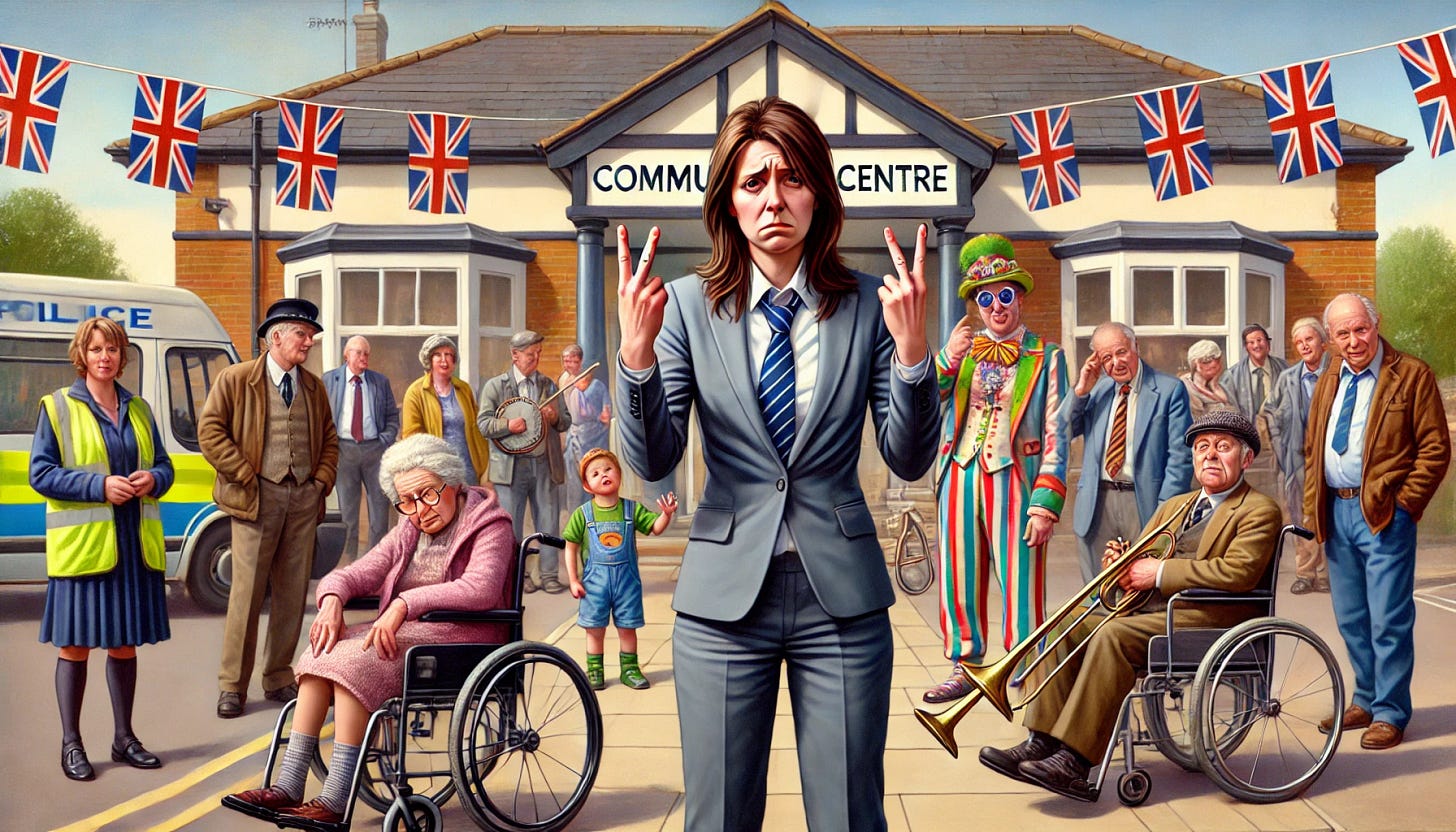

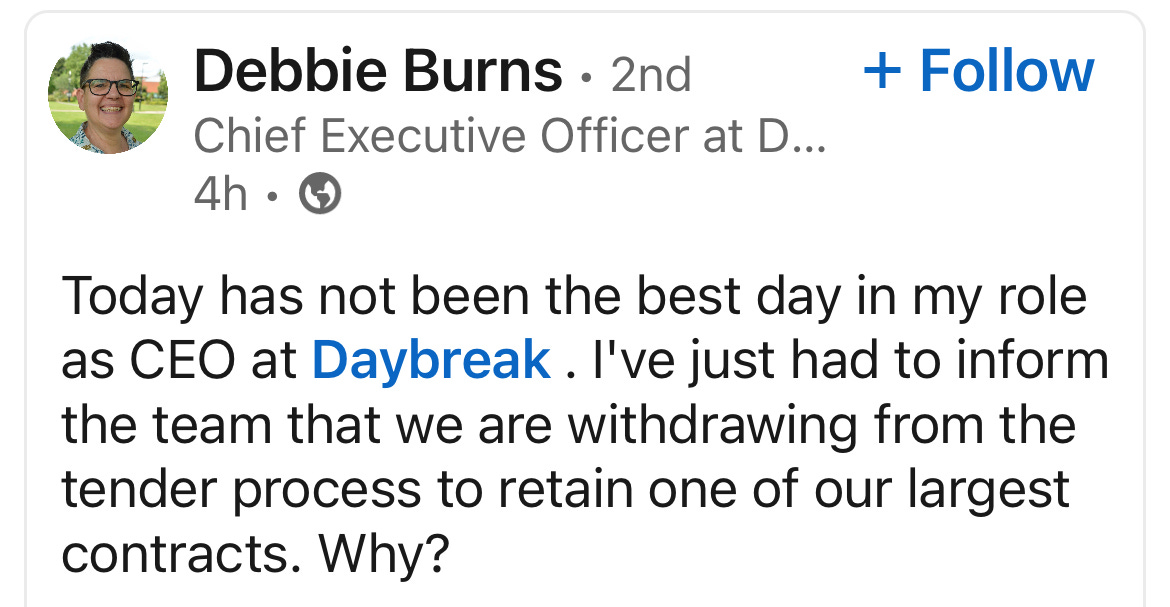
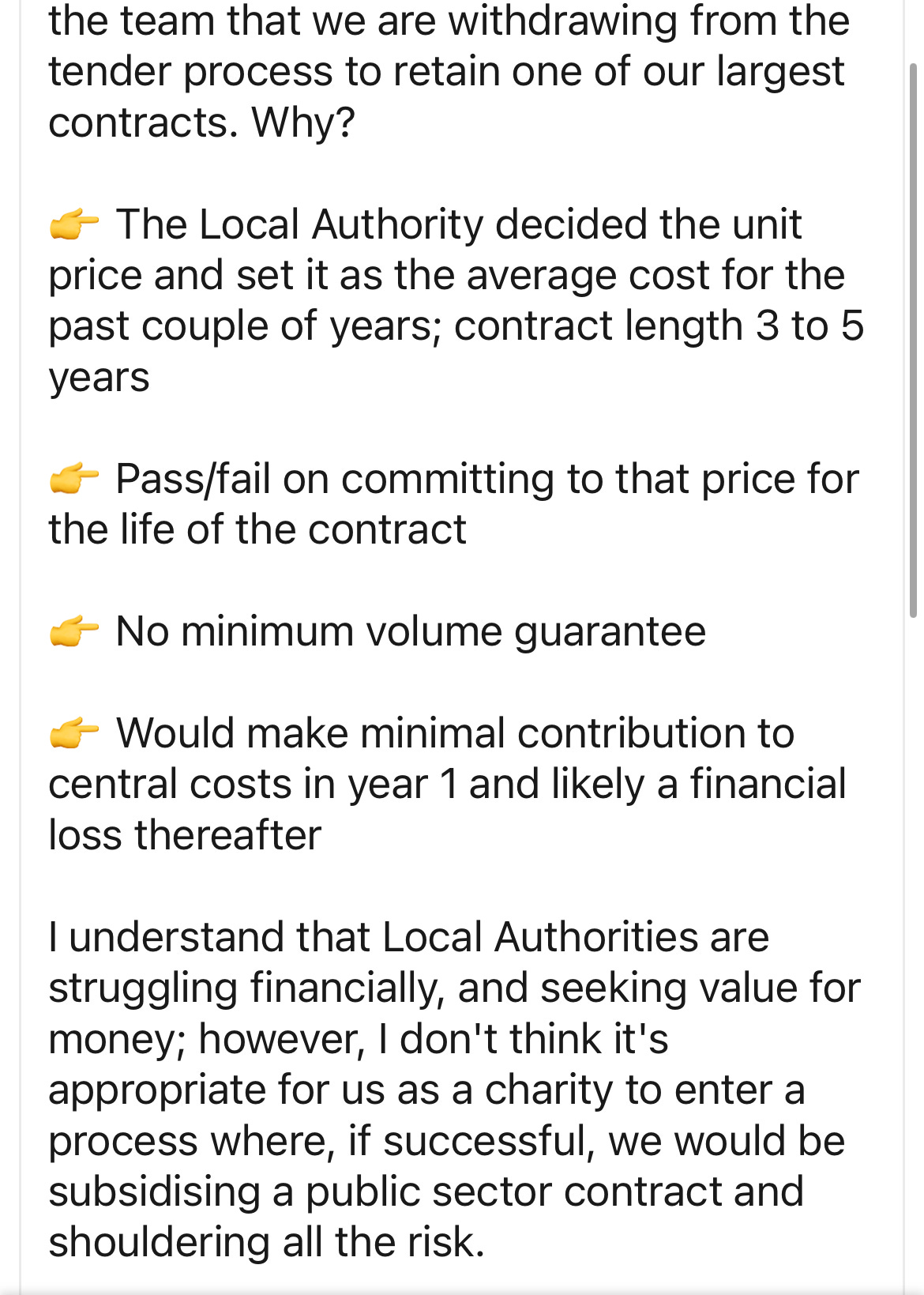
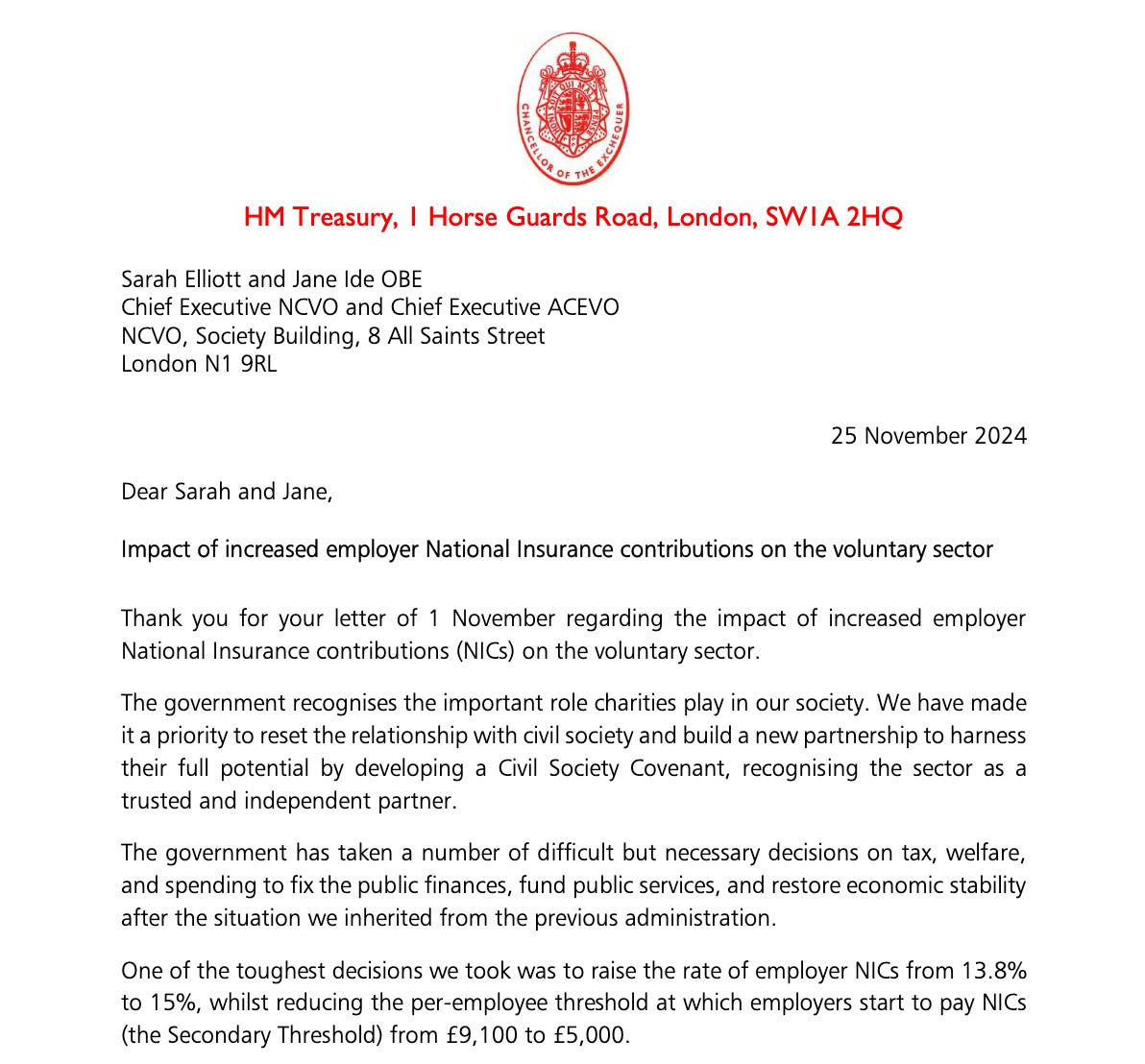

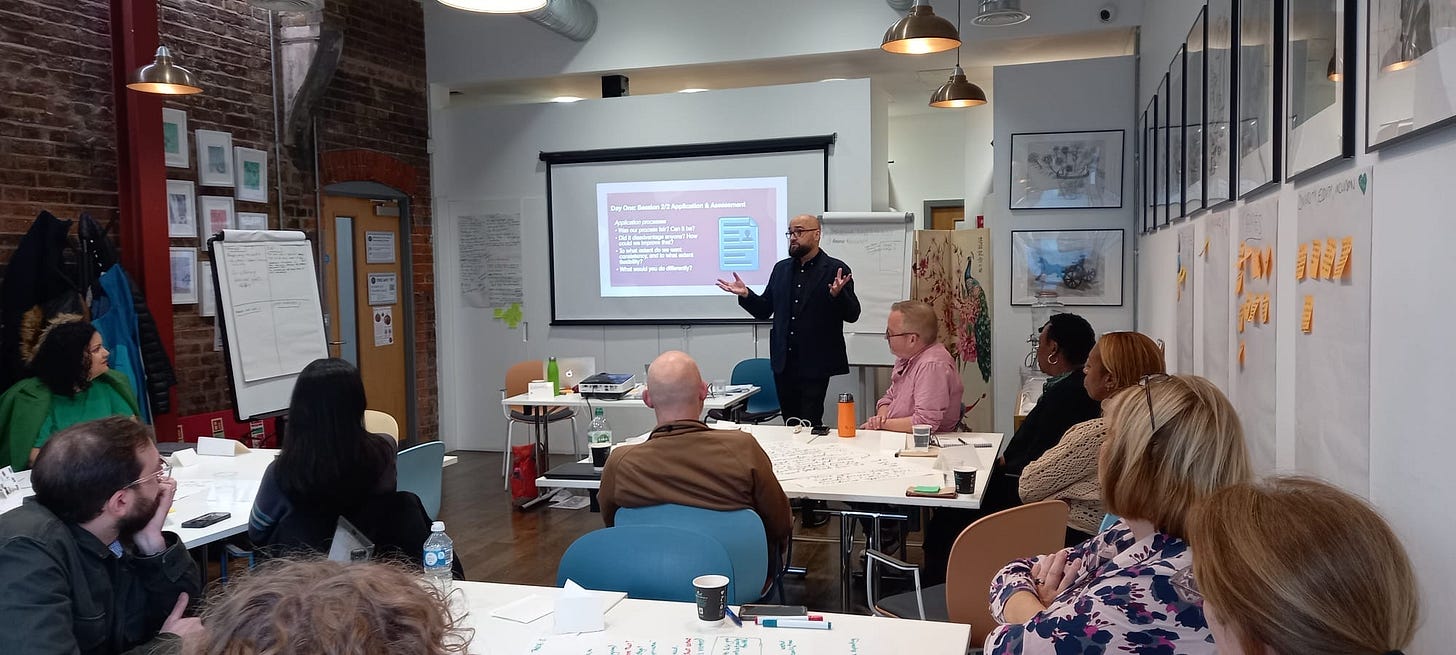
So great to see your posts being so honest about the challenges in the sector
"there is just no money". I have to disagree with you here. The government creates money through the Bank of England. We are not short of money, we are short of taxes and Reeves refuses to tax those who can afford to pay. I keep hearing this mantra and I refuse to accept it.